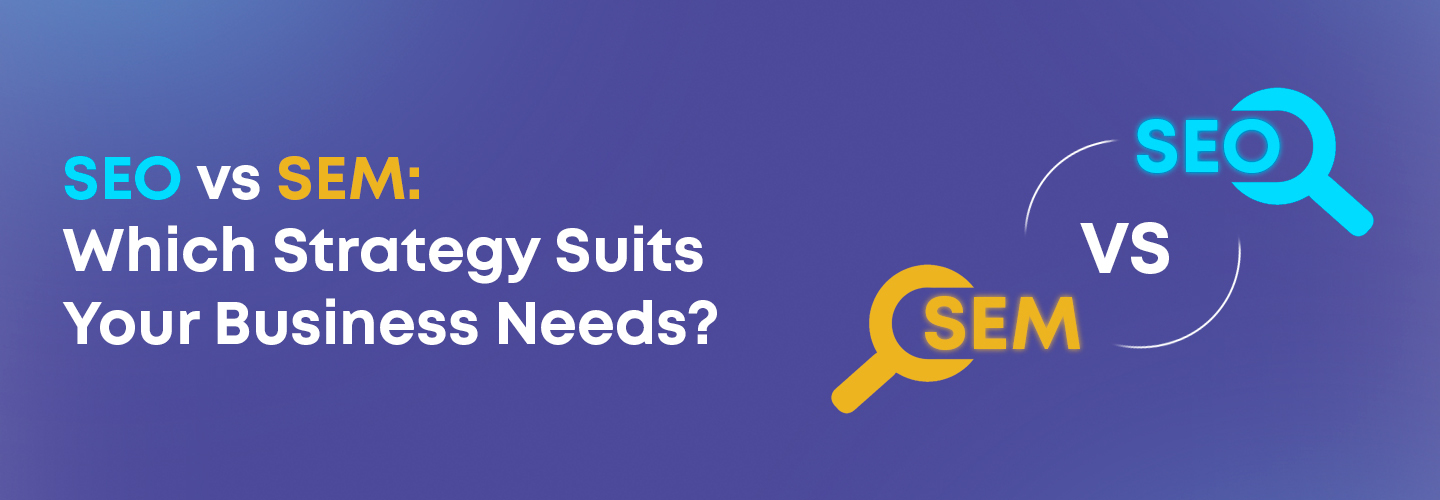May 5, 2025
SEO vs. SEM: Which Strategy Suits Your Business Needs?
Digital landscape is always evolving, businesses have to constantly seek for effective ways to enhance their online visibility. There are two primary strategies that often come into play: Search Engine Optimization (SEO) and Search Engine Marketing (SEM). Both of their aims are to increase your website’s presence on search engines, they function differently and serve different purposes. So, how do you really decide which strategy aligns best with your business goals? Let us walk through the specifics of SEO and SEM to help you in making an informed decision.
Understanding SEO: Building Organic Visibility
SEO is the practice of optimizing your website to rank higher in organic (non-paid) search engine results. It involves various techniques, including keyword research, content creation, on-page optimization, and building backlinks. The goal is to improve your site's relevance and authority, making it more attractive to search engines like Google.
SEO is all about optimizing your website to rank at top in organic search engine results. It involves various techniques, Including keyword research, content creation, on-page optimization, and building backlinks. Its goal is to make your website more relevant and credible, and thus more appealing to search engines like Google.
Key Benefits of SEO:
Cost-Effective: After your website ranks well, you can get consistent traffic without spending on ads.
Long-Term Outcome: SEO efforts accumulate over time, leading to sustained exposure and traffic
Credibility and Trust: High organic rankings tend to convey authority and trustworthiness to the users.
However, SEO is not a quick fix. It requires time, patience, and regular effort in order to achieve good results.
Exploring SEM: Accelerating Visibility Through Paid Ads
SEM, on the other hand, involves promoting your site with paid advertisements so that it will appear in search engine results. This most commonly involves Pay-Per-Click (PPC) campaigns, where you pay for keyword bidding in order to display ads to your target audience.
Key Benefits of SEM:
Fast Results: Your ads appear on the front page of search results shortly after campaign launch.
Targeted Reach: SEM allows specific targeting based on demographics, location, device, etc.
Trackable ROI: With detailed analytics, you're able to view how your ads are performing and adjust your strategy if necessary.
SEM gives fast visibility, but you need to keep paying for it. When you stop spending on ads, the traffic usually decreases too.
SEO vs. SEM: What Sets Them Apart?
SEO is about optimizing your site to rank organically in the long run. It's cost-effective and creates long-term visibility but takes time to see results. SEM, on the other hand, is paid advertising that provides you with immediate visibility on search engines, but only as long as you continue paying.
SEO builds trust and is best for long-term growth. SEM is ideal when you require fast traffic and have a flexible ad budget. Both have their advantages, and the right one to use depends on your objectives, timeline, and budget.
Choosing the Right Strategy for Your Business
It’s your decision to choose between SEO and SEM depending on various factors, including your business objectives, budget, and timeline
Go with SEO if:
● You're looking for long-term growth and sustainability.
● You have a small budget but can spend time and effort over months.
● Building brand authority and trust are must-haves.
Go with SEM if:
● You require immediate visibility, say for a product launch or time-sensitive offer.
● You have a flexible budget for advertising.
● Quick lead generation is essential for your business.
Take a Combined Approach
Blending both SEO and SEM can provide the best of both worlds. While SEM can give you immediate traffic and exposure, SEO establishes a solid ground for long-term success. Through the use of both strategies, you can ensure a steady online presence and adapt to different marketing needs.
Both SEO and SEM are worth having in your digital marketing toolkit. You need to know the difference and have them aligned with your business goals. It doesn't matter if you select SEO, SEM, or both; what matters is that you have a strategic plan at hand that will give you the best exposure online and drive growth.
If you're not sure which strategy is best for your business, seeking advice from digital marketing experts can give you tailored advice and recommendations. Keep in mind that the best strategy is one that fits your objectives, budget, and the specific needs of your audience.
Frequently Asked Questions: Choosing Between SEO and SEM for Your Business Growth
Q1. What is the main difference between SEO and SEM?
A: SEO (Search Engine Optimization) focuses on organic traffic through content, keywords, and website optimization. SEM (Search Engine Marketing) includes paid ads to appear in search results, offering faster visibility.
Q2. Which is better for long-term results—SEO or SEM?
A: SEO is better for long-term results as it builds sustainable traffic and brand authority. SEM works best for immediate leads but requires a continuous ad budget.
Q3. Can I use both SEO and SEM together?
A: Yes, combining both can deliver strong results. SEM offers quick wins while SEO builds long-term value. A hybrid strategy ensures traffic from both paid and organic sources.
Q4. When should I choose SEM over SEO?
A: Use SEM when you need quick results, like during product launches, limited-time offers, or while testing a new market. It helps you get instant visibility and traffic.
Q5. Does SEO cost less than SEM?
A: Yes. SEO usually involves upfront effort and time investment, while SEM has ongoing ad spend. Over time, SEO becomes more cost-effective as organic traffic grows without additional ad costs.


Comments
No comments yet. Be the first to comment!